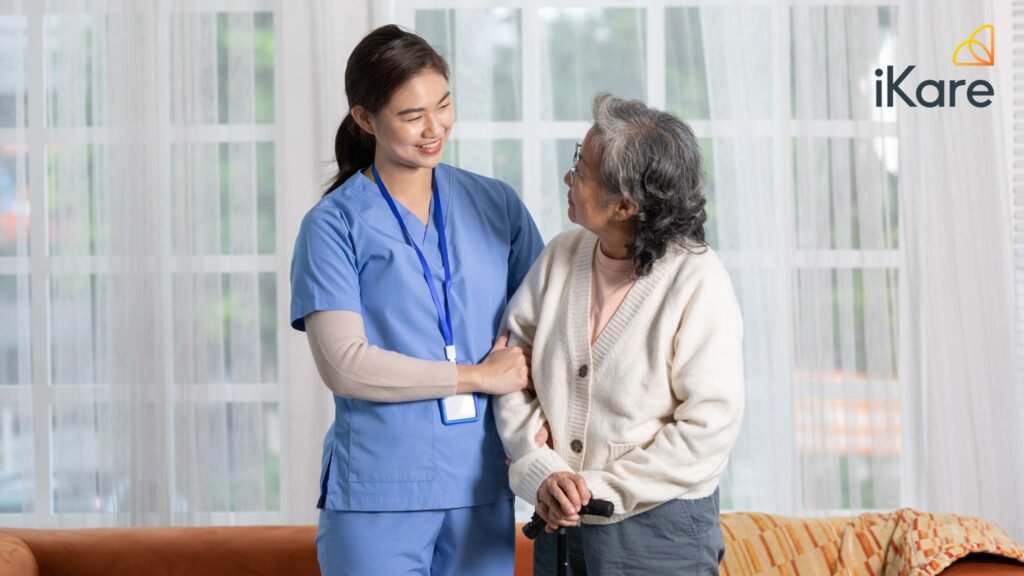
The Role of Caregiver Training in Quality Home Care
In Singapore, where the population is ageing rapidly, quality home care has become an essential service, allowing individuals to remain in the comfort of their homes while receiving necessary support. Delivering quality care isn’t as simple as providing assistance, it requires specific skills, knowledge and compassion.
Understanding The Importance Of a Quality Care Giver
- Providing Essential Support for Daily Living
At ikare, our caregivers assist individuals with daily tasks like bathing, dressing and meal preparation. This support will allow people with disabilities, chronic illnesses or age-related limitations to maintain a comfortable and dignified life at home.
- Emotional and Mental Well-being
Beyond physical care, our caregivers will also offer emotional support, companionship, and social interaction. Which will help combat loneliness and depression. Which are common among elderly and disabled individuals, especially in Singapore.
- Helping Families Manage Responsibilities
Another benefit of choosing us is that, our caregivers help alleviate the burden on the family members by providing support, allowing family members to balance their own work and personal lives without compromising the quality of care of their loved ones.

3 Core Elements of Effective Caregiver Training
Training programs for caregivers are designed to address the wide variety of needs they might encounter. Here are some core areas that quality training programs focus on:
1. Medical and Emergency Skills
Caregivers often need basic medical training, including first aid and CPR, which will enable them to respond effectively to emergencies. For instance when an elderly client falls, our trained caregiver will assess the situation and assist the client without causing further injury and decide if emergency help is required.
2. Communication Skills for Building Trust
Worried about communication issues? Fear not! Our caregivers are well-trained in communication and are able to better connect with your client, gaining your trust and cooperation. Effective communication is not only about giving instructions but also about listening and empathizing. For example, an untrained caregiver might respond directly, which can cause distress. However, our trained caregiver might acknowledge your client’s feelings and gently redirect the conversation to happier memories, creating a comforting environment.
3. Safety Protocols and Home Hazard Awareness
Safety training will help caregivers identify and mitigate hazards in the home, ensuring a safe living environment for your client. One of the examples is, that our caregivers may spot tripping hazards such as loose rugs or cluttered hallways, and address these issues. Our caregivers are also trained to lift or assist your client with the proper body mechanics, reducing the risk of injury to both parties.

Understanding The Importance Of a Well-Trained Caregiver
In Singapore chronic conditions are common amongst people of older age, so here is why our caregiver will provide you with the best support. Our well-trained caregiver has the knowledge to manage tasks effectively. For instance, if your client has diabetes, our trained caregiver will carry out regular blood sugar checks and the need for a specific diet to manage blood sugar levels. Additionally, our caregivers recognize the importance of adapting their approach to align with your specific requirements. For instance, our caregiver assisting an elderly client with mobility issues might create a personalized exercise routine that will help strengthen the client’s muscles and improve overall balance, helping them remain as independent as possible.
Improving Quality Of Life For Clients
A well-trained caregiver doesn’t just focus on the basic needs of a client but works to enhance the client’s overall quality of life. For example, our caregivers may engage clients in activities that provide mental stimulation, such as puzzles, reading, or conversation, which helps keep their minds sharp. By providing consistent, compassionate, and skilful care, our trained caregiver will help clients maintain a higher level of independence, satisfaction, and joy in their daily lives.

